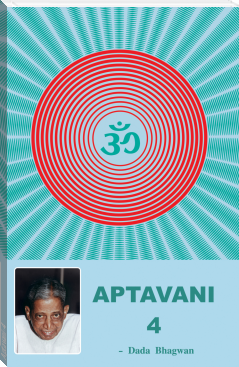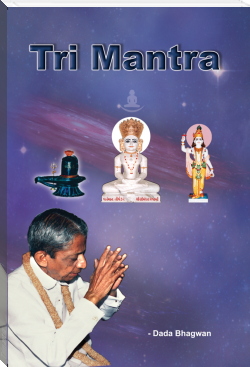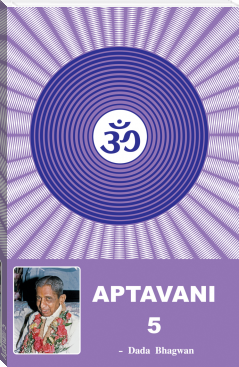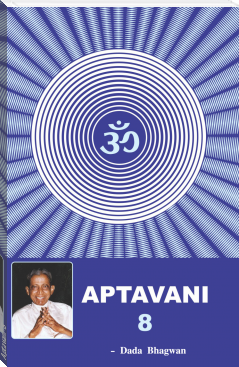Aptavani-4, Dada Bhagwan [ebook reader library .TXT] 📗

- Author: Dada Bhagwan
Book online «Aptavani-4, Dada Bhagwan [ebook reader library .TXT] 📗». Author Dada Bhagwan
Shukladhyan (meditation as the Self) is a natural state. After artadhyan occurs, if there is the belief that, “I am doing artadhyan,” then the ego of ‘doership’ is present. The ego is the dhyata (the one that meditates) in artadhyan, raudradhyan and dharmadhyan. In shukladhyan, however,the ego is not the dhyata, so therefore it is anatural state. It is the state of the Self ( Atma-parinati).
For the purpose of attaining moksha, no other meditation is as important as the meditation of pure Self (Atmadhyan or shukladhyan). The meditation of the Self (Atma) keeps one in constant bliss.
To remove attachment-abhorrence, meditation is not required. If the science of the Vitarag is known, attachment-abhorrence departs naturally.
[3] Prarabdha – Purusharth
Without understanding the line of demarcation between destiny(prarabdha) and self-effort (free will; purusharth), how can one understand one’s own ‘doership’ or ‘non-doership’? The whole world is engulfed in this unsolved problem. Who else can show you the difference between the two, other than the Gnani Purush, who has attained the exact state of real purusharth? In the world, in this day and age of the time, the subtlest differences between destiny and self-effort have been exposed through the speech of the deeply revered Gnani Purush Dadashri. It opens up a new way for the seekers!
Whatever is done through the five senses is not self-effort(purusharth), but destiny(prarabdha). From morning till evening, a person runs around, preoccupied with his job or business, respires, reads books and scriptures, meditates, does chanting of God’s name (japa or mantra) and penance. That is destiny (prarabdha). After we eat our food, what purusharth (self-effort) do we make for its digestion? Nature runs our ‘inner machinery’ so pleasantly, without any interference in our part, so will it not run the ‘outer’ matters as well? But because of the ignorance about it, one cannot help one’s egoism of, ‘I am the doer’!
In the running waters of the river Narmada, if a rock turns into the shape of an idol (shaligram), who did what sort of self-effort there? And if the other rocks remained stones and sunk in the ocean, is it because of their ‘laziness’? Who is the ‘doer’ here, and how much ‘doership’ is there? Things happen according to whatever circumstances one encounters! In the path of natural and spiritual evolution (samsaran marg), all the living beings, some after infinite collisions and wanderings, take birth in India. And there, if one meets the Gnani Purush, and by his grace, attains the Self-realization, one becomes an idol (shaligram)! Only after Self-realization does one become the ‘Self’ (Purush) and does the ‘real’ ‘Self-effort’(purusharth). Until then, it is called deluded or illusory self-effort(bhrant purusharth). Real Self-effort is when there is no attachment-abhorrence in the resultant effect of the non-Self complex (pudgal).
Because of the existence of ego, the seeds (causes) of karma are being sown. And when they yield fruits (effects); the result is either bitter or sweet. Now it is considered deluded self-effort(bhrant-purusharth) to change an improper ‘effect’ to a proper one! Whatever circumstances that present themselves is destiny, and self-effort is needed to maintain equanimity. To maintain steadiness in ‘slippery’ circumstances, is self-effort. To change artadhyan and raudradhyan into dharmadhyan is self-effort.
The ‘Akram Vignani’ (the ‘scientist’ of the direct path to the Self) has removed the web of misunderstanding about destiny (prarabdha) and self-effort – free will (purusharth) and unraveled the right understanding about ‘who the doer is’, through his discovery of vyavasthit shakti (‘Scientific Circumstantial Evidence’). This helps the Self-realized to reach the state of the absolute Self! As long as there is the awareness of, ‘I am the ‘doer’,’ the understanding of ‘Scientific Circumstantial Evidences’ is like a golden dagger! Where there is ego; the ‘self’ becomes the ‘doer’. Where there is no ego, the ‘doer’ is ‘Scientific Circumstantial Evidences.’
Pure, applied, awakened awareness of the Self (shuddha upayog) is the ‘real’ self-effort(purusharth). The victory over kashays (anger, pride, deceit and greed) is called self-effort (purusharth). And absolute equanimity (samata) has been called the state of the Self that arises from Gnan. Self-control (yama), disciplines (niyam), and restraints (saiyam) have been called self-efforts. What is the difference between restraints(saiyam) and penance(tapa)? There is no penance (tapa) in saiyam;whereas in penance (tapa) there is ‘heat’; the mind is being heated! To obey the Gnani’s Agnas (special directives given by the Gnani Purush that sustains the enlightened state after the Gnan Vidhi) is Self-effort – that is the only religion.
Neither destiny nor self-effort is the higher; the one who understands them both is the higher, so says the Gnani Purush.
To eat junk food is karma of destiny (effect) and to get dysentery is the result of destiny karma (effect of effect). Eating junk food is the result of the accumulated karma (sanchit karma) of the previous life! So now, how can this result of destiny karma be changed? Change can only be made while the accumulating karmas are being ‘charged’ or created.
That which happens in this life (dravya), is all destiny, and intent (bhaav) is all self-effort. In the state of illusion (non-Self-realized; bhranti), all human beings have continual intent-based self-effort (bhaav purusharth), on account of which the bonds of karma for the next life are created; moreover, they themselves are not even aware of this!
[4] Shraddha (Faith)
Those who make a mockery of blind faith (andha-shraddha) do not know how much blind faith they themselves have! On what faith is the act of drinking water done? What proof is there that there is no poison in it? What is the proof that an insect or a tiny lizard has not fallen in the food? Does anyone inquire about this? Are people not moving on, with blind faith? Thus, not a single step is taken without blind faith, so how can one criticize anyone else’s blind faith?
[5] Opinion
Vision (drashti) is created on the basis of opinions (abhipraya), and then one ‘sees’ according to that vision. It is not the fault of the vision if one feels uneasy with a certain person. The mistake is being made by the opinion that has led to such a vision(drashti).
The vision with “prejudice” creates the worldly life (the perpetual cycle of birth and death). In spite of being an eyewitness to a theft, the one who does not have any prejudice in vision is a Gnani (the enlightened One). What proof is there that tomorrow the thief will not become honest and respectable?
There is nothing to object to. If the senses relish a tasty mango, but afterward if the memory of it lingers on; it is detrimental, because behind the memory there is the opinion that “this mango is good,” and that opinion will result in attachment-abhorrence(raag-dwesh).
A strong opinion focused on one particular thing will result in a major obstruction (atkan). Comparatively the effect of the obstruction of many scattered opinions will be significantly terrible.
“The sensual pleasures (vishay) do not have attachment - abhorrence; only the belief of the opinion has attachment-abhorrence.” ~ Dadashri
This quote of the Gnani drives away the notion of doing relentless exertion to become free from sensual pleasures. By saying it is ‘like an elephant’s bath’ (elephants after bathing in water, spread dirt on themselves); it makes one alert towards removing the root cause: the wrong belief about the opinion, of there being any lasting happiness in the pleasure of the senses.
Once it is decided that opinions are to be broken, they start to break down. Opinions that are very deeply entrenched, can be depleted after doing pratikraman (repentance and asking for forgiveness for the error) everyday for two hours! The one who has attained the Soul(Atma), the one who has become Self-realized(Purush), is capable of any endeavor (purusharth) or extraordinary effort(parakram )!
Whatever one’s opinion, such will be the non-Self complex of mind, speech and body(pudgal) that forms in the next life.
It is necessary to detach and remove the opinion, about the opinion that has remained in a subtle form.
Who makes one make opinions? Only societal influence(loksangnya; worldly peer pressure), because one’s belief is based on popular knowledge, and accordingly, the intellect makes the decision as to how one behaves. Once the ‘knowledge of the Gnani’ (Gnani-sangnya) is followed, the effect of the knowledge of people (loksangnya) becomes extinct!
The vibrations of even the slightest adverse thought about another person will reach that person and give results. Here doing ‘shoot-on-sight’ pratikraman will prevent those vibrations from reaching that person, or else erases the vibrations that may have reached that person. And once the opinion is erased, speech and conduct towards that person become natural, to the extent that they cannot even ‘touch’ the other person. Conversely, the view with the opinion of seeing faults, casts its shadow on the mind of the other person. And it is because of that, that one feels uneasiness in that person’s presence.
To change the opinion, one has to supplant it with its opposite opinion. To erase the opinion, that someone is a thief, one has to say that he is an honest and respected man and ultimately, the vision that he is really ‘pure Soul’(Shuddhatma) has to be applied!
Opinion is the reason (cause) for speech with the link of continual hurt (tantili vani—speech associated with lingering effect); whereas, suspicion (shanka) is one of the reasons (cause) for opinion.
“Opinion is dependent upon the receptacle of the intellect (buddhi no ashaya)” ~ Dadashri
The opinion depends on where the intellect has perceived happiness to be. If one thinks happiness lies in a French haircut, one’s opinion for a French haircut develops.
What hinders the state of the infinite bliss of the Self, after Self-realization in Akram Vignan? – Opinion! Once two to five major opinions are gone, a state of liberation prevails!
The seed (of karma) is sown, not by action (kriya), but by motive (hetu–intention behind action); by opinions! The only opinions worthy of welcome are those for celibacy (brahmacharya), and for the fact that the physical body is the greatest of deceivers (dago)! Opinion is made up of subatomic particles (parmanus) of the ego. Opinion shows personalities: it alters one’s vision completely. There is no objection to ‘lifeless’ opinions; however, opinions backed with insistence, veil the Gnan.
To be free from the opinions about the inanimate (achetan) is relatively easy once you decide to do so. Whereas, even if you give up the opinions about the mishrachetan (power chetan; the relative self, other living beings), the other person will still not leave you alone! By forming opinions about other human beings, whose faces contort with anger and revenge, what grave results are invited!
Opinion invites obstacles (antaray). There are terrible perils from the obstacles caused by opinions; they increasingly bind one in places where one needs to be free.
This human body complex, works according to the opinion of the ‘charged’ self (pratishthit atma;the relative self), within which the Self is only giving presence as the One with devoid of worldly attachment(udaseen bhaav).
[6] The Blindness of ‘Know-How’
He that knows nothing in this world is a ‘Gnani.’ The Gnani, who appears to others as ‘highly intelligent’, is actually abuddha (free from the use of intellect). The Gnani says, “Even at age seventy, I still do not know how to shave.” Those who believe that they are “experts” are cheating themselves and everyone else. No one is capable of becoming an “expert”. Being an expert, is a





Comments (0)